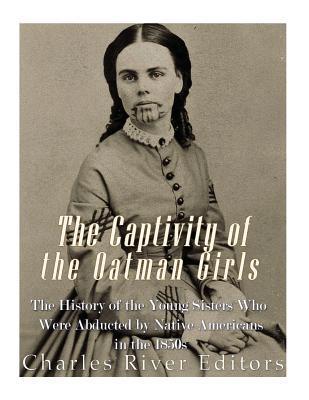The Captivity of the Oatman Girls: The History of the Young Sisters Who Were Abducted by Native Americans in the 1850s

The Captivity of the Oatman Girls: The History of the Young Sisters Who Were Abducted by Native Americans in the 1850s
*Includes pictures
*Includes Olive Oatman's quotes
*Includes online resources and a bibliography for further reading
"I looked around and saw my poor mother, with her youngest child clasped in her arms, and both of them still, as if the work of death had already been completed; a little distance on the opposite side of the wagon, stood little Mary Ann, with her face covered with her hands, sobbing aloud, and a huge looking Indian standing over her; the rest were motionless, save a younger brother and my father, all upon the ground dead or dying. At this sight a thrill of icy coldness passed over me; I thought I had been struck; my thoughts began to reel and became irregular and confused; I fainted and sank to the earth, and for a while, I know not how long, I was insensible." - Olive Oatman
On the North American continent, Native American tribes carried out abductions against the new European settlers from the time they first set foot on eastern shores. Some of the women taken in the colonial to early American period went on to become respected figures in their new environments, while others lived out their lives as slaves. Various tribes perceived the historical value of women's social personalities through different prisms, and even those groups living in the same region often exhibited dissimilar behavior toward them. For some of the more aggressive tribal societies, to commit atrocities against women and their children engaged the same mindset as that adopted for male-to-male warfare. What European sensibilities failed to grasp, despite the home continent's own lurid history, was that the numerous indigenous cultures of North America were already in the habit of perpetrating such abductions against each other and had for thousands of years. Whether the enemy was European or domestic, old or young, male or female, the deeply embedded cultural habit was the same. To steal women from an enemy often brought the same adulation from the collective as the stealing of horses, and abduction initiated by even a single individual brought honor to that person and his family. In the American wilderness, instances occurred wherein the abduction of either horses or human beings was considered essential to survival, if not to pride and manhood.
Abductees were generally adopted into the tribe through a specific ritual. Some were based on "violent hazing," while for others, entry into the community was a "mere formality." Children and adoles
PRP: 86.34 Lei
Acesta este Prețul Recomandat de Producător. Prețul de vânzare al produsului este afișat mai jos.
77.71Lei
77.71Lei
86.34 LeiLivrare in 2-4 saptamani
Descrierea produsului
*Includes pictures
*Includes Olive Oatman's quotes
*Includes online resources and a bibliography for further reading
"I looked around and saw my poor mother, with her youngest child clasped in her arms, and both of them still, as if the work of death had already been completed; a little distance on the opposite side of the wagon, stood little Mary Ann, with her face covered with her hands, sobbing aloud, and a huge looking Indian standing over her; the rest were motionless, save a younger brother and my father, all upon the ground dead or dying. At this sight a thrill of icy coldness passed over me; I thought I had been struck; my thoughts began to reel and became irregular and confused; I fainted and sank to the earth, and for a while, I know not how long, I was insensible." - Olive Oatman
On the North American continent, Native American tribes carried out abductions against the new European settlers from the time they first set foot on eastern shores. Some of the women taken in the colonial to early American period went on to become respected figures in their new environments, while others lived out their lives as slaves. Various tribes perceived the historical value of women's social personalities through different prisms, and even those groups living in the same region often exhibited dissimilar behavior toward them. For some of the more aggressive tribal societies, to commit atrocities against women and their children engaged the same mindset as that adopted for male-to-male warfare. What European sensibilities failed to grasp, despite the home continent's own lurid history, was that the numerous indigenous cultures of North America were already in the habit of perpetrating such abductions against each other and had for thousands of years. Whether the enemy was European or domestic, old or young, male or female, the deeply embedded cultural habit was the same. To steal women from an enemy often brought the same adulation from the collective as the stealing of horses, and abduction initiated by even a single individual brought honor to that person and his family. In the American wilderness, instances occurred wherein the abduction of either horses or human beings was considered essential to survival, if not to pride and manhood.
Abductees were generally adopted into the tribe through a specific ritual. Some were based on "violent hazing," while for others, entry into the community was a "mere formality." Children and adoles
Detaliile produsului











